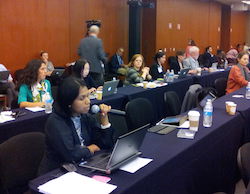Sunday
Apr032016
IAEG-SDGs Day 3: Stakeholder statement on metadata
Posted:  Sunday, April 3, 2016 at 2:55PM
Sunday, April 3, 2016 at 2:55PM
 Sunday, April 3, 2016 at 2:55PM
Sunday, April 3, 2016 at 2:55PM  The following statement was delivered on behalf of civil society by ARROW on metadata, by Sai Jyothirmai Racherla, Asian-Pacific Resource & Research Centre for Women (ARROW):
The following statement was delivered on behalf of civil society by ARROW on metadata, by Sai Jyothirmai Racherla, Asian-Pacific Resource & Research Centre for Women (ARROW):
Civil Society Statement on Metadata Compilation on Global SDG Indicators.
By Sai Jyothirmai Racherla – Asian Pacific Resource and Research Centre for Women (ARROW) on behalf of all civil society stakeholders.
- Firstly, we propose the establishment of a multi-stakeholder mechanism, whereby a Global Consensus on Data, is created by the UN, to adopt principles concerning legal, technical, privacy, geospatial and statistical standards on indicator data.
- We call for the establishment of a task force, on metadata and data sources, which is open to all stakeholders including civil society.
- We reiterate OHCHR input today, that metadata parameters, integrate human rights law obligations, and principles of equality, non-discrimination, gender equality, and equity.
- Data disaggregation will be a key element to be considered in metadata. While considering the characteristics for data disaggregation, the General comment No. 20 (2009), of the Committee on Economic, Social and Cultural Rights, can be taken as a reference. This provides an authoritative guidance, for data disaggregation efforts.
- We call for the definitions of SDG indicators, to be comprehensive, to measure the full extent of the SDG targets. These definitions should be standardised for cross comparability of indicators, at all levels.
- We call upon the Member States, to put in place human rights based data collection, and safeguard processes, that will address, the human rights risks in collection, processing, analysing and dissemination of data. Capacity strengthening of NSOs, in this area will be crucial.
- We emphasise that the establishment and functioning of civil registration and vital statistics (CRVS) systems is crucial especially in our developing countries. The Agenda 2030 process should aim to put in place CRVS systems that will achieve universal registration of all key life events/ vital statistics and this could be used as data sources at national level. The health, education and social sector has a particularly strong need for functional CRVS systems especially to track the progress of strategies to reduce maternal mortality, and disease-specific mortality and to address inequalities in all these areas.
- Further to this administrative data, routine facility information systems, facility surveys, population based surveys, DHS, MICS should all go hand in hand, to ensure robust, and periodic data is generated, on the SDG implementation. In addition, there is a need to explore, open data systems, and new technologies in the collection of data.
- We reiterate that civil society, some of whom are high quality data producers, especially at the community and national level, can work with NSOs, to ensure these data sources, are considered, and complement the official data sources, in the full measurement of SDG indicators.
We call for consideration of above, in the metadata compilation process on Global SDG indicators
Statement developed by
Sai Jyothirmai Racherla - Asian Pacific Resource and Research Centre for Women (ARROW)
Eric Swanson- Open Data Watch
Galina Angarova- Tebtebba
Lara Cousins- WGNRR
Comments Off |  Permalink
Permalink
 Permalink
Permalink in  Indicators
Indicators
 Indicators
Indicators 